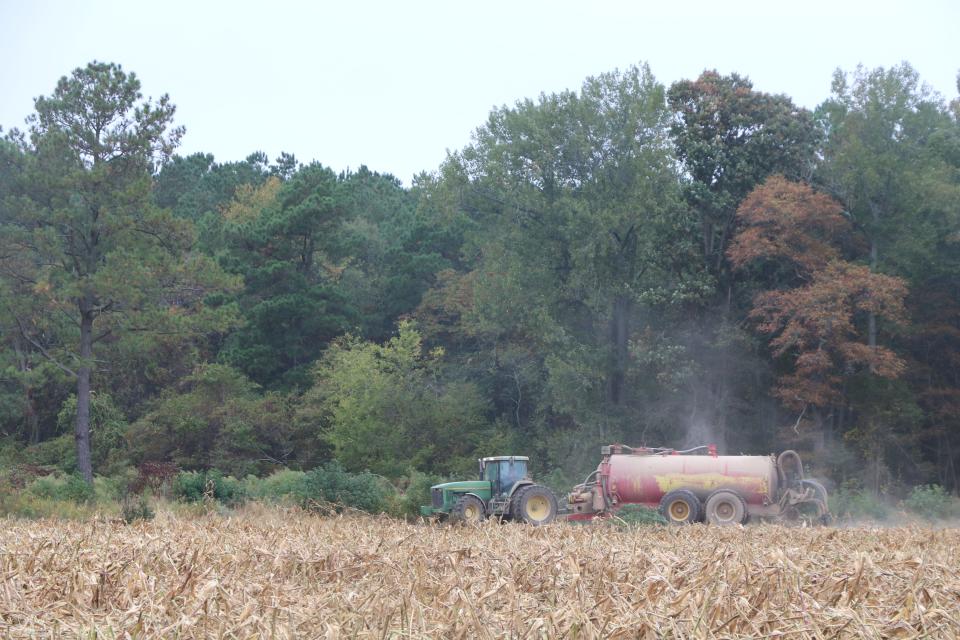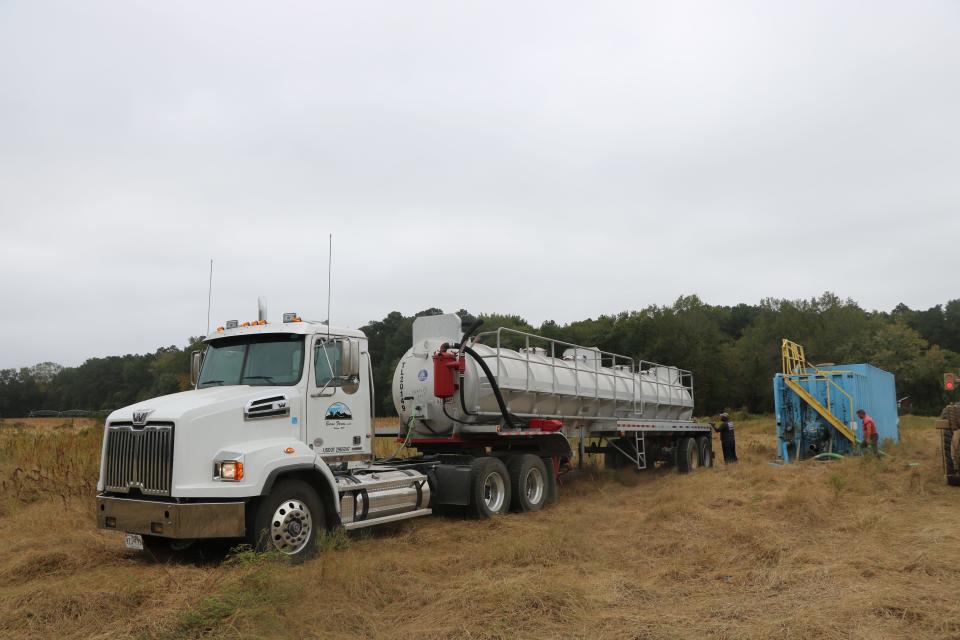'This isn't farming, it's dumping.' Debate about what do with sludge rages on in Maryland
- Oops!Something went wrong.Please try again later.
The General Assembly is zeroing in on industrial sludge regulations with discussions on a cross-filed bill that would require a permit for its storage and use.
The Industrial Sludge Utilization Permit bill, or SB 1074 and HB 0991, was introduced by Del. Sara Love, D-16th-Montgomery, and Sen. Justin Ready, R-5th-Carroll and Frederick County. The bill has gotten past its first reading in the Environment and Transportation Committee, and the Education, Energy, and the Environment Committee, and creates a new permit program for the hauling, storage and proper application of “dissolved air flotation” material, which is used by farmers on their fields as a more affordable option to other expensive fertilizers.
“Public nuisances related to the use of industrial sludge in agriculture are a growing concern in communities across Maryland,” Love said. “Mishandling and overapplication of sludge can lead to nutrient runoff that has negative impacts on waterways and the Bay. This bipartisan legislation will bridge gaps in current state regulation to ensure that farmers who use this material know exactly what is in it and use.”

According to both Love and Ready, the runoff from the sludge also creates an incredibly foul odor, with a number of environmental groups citing public health issues with the use of industrial sludge.
Delmarva Chicken Association says it's working with lawmakers on issue
"The Delmarva Chicken Association has been working closely with the bill sponsors and the Maryland Department of Agriculture on amendments to the bill that address legislators’ concerns while not negatively impacting those who have responsibly stored or utilized DAF material as a registered soil conditioner to better grow crops," said James Fisher, a spokesperson for the association.
A common component of the DAF material is chicken waste and other biological components. According to the chicken association, 2022 tallied 1,334 chicken growers on Delmarva. Independent, family-owned farms operated 4,889 chicken houses, with a total capacity of 134 million chickens, and the Delmarva chicken community raised 596 million chickens and produced 4.4 billion pounds of shelf and table ready chicken.
According to the Chesapeake Bay Foundation, done properly, sludge could be applied to land only in certain quantities and during certain times of the year to avoid runoff into nearby waterways. That includes not during winter when dormant plants do not absorb nutrients.
More on inflation and poultry Eastern Shore poultry industry keeps growing, with turbulent mix of successes, challenges
Counties on Eastern Shore, across Maryland, act on sludge

The foundation contends community concerns over sludge are widespread.
Public hearings in Caroline, Carroll, Talbot, Dorchester, and Wicomico counties have already been held to discuss potential harms to human health, the environment and personal livelihood caused by poor sludge handling. Counties including Caroline and Wicomico have acted to ban storage of the material as bills like this make their way through the legislative process.
“I have been contacted by many of my constituents about the use of industrial sludge as an exclusive fertilizer,” Ready said. “The most common complaint is that unlike manure and other types of traditional fertilizers, the smell does not dissipate. This forces neighbors — many of whom are in farming themselves — to abandon spending any time outdoors for most warm weather days of the year.”
The proposed legislation would strengthen Maryland’s regulation of DAF by requiring its handlers to hold a permit, giving the Maryland Department of the Environment and Maryland Department of Agriculture additional tools to better account for its safe and effective use.
Chesapeake Shipbuilding update: Get a look inside new Chesapeake Shipbuilding office building, and how it came together
The foundation noted hauling, storing, and applying industrial sludge in Maryland has become a profitable business due to the state’s lax permitting and oversight.
“There’s more sludge coming into Maryland than there are places to safely store it, which is why we’re seeing such blatant mishandling and irresponsible land application. In most cases this isn’t farming, it’s dumping. We are calling on Maryland legislators to better assess what’s in this sludge material and enforce permits to prevent Maryland from drowning in it," said Matt Pluta, Choptank Riverkeeper.
Wicomico County severely curtails use of sludge tanks
In Sept. 2022, the Wicomico County Council successfully introduced a bill that could severely limit, if not ban, sludge tanks in the county.
The bill ranged from banning future open-air sludge tanks or simply stipulating where they can be placed after a number of residents complained of noxious smells, medical issues and longstanding community safety concerns.
Locally, the Neighborhood Action Group, a community organization started by Hebron residents to raise awareness of sludge tanks, say the open-air tank in Hebron can hold 3 million gallons, 23-feet tall, and 147-feet in diameter when its construction was completed in 2021. There is currently no uniform size for such tanks.
Legislative Bill 2022-03 was a legislative bill in Wicomico County to extend the moratorium on the issuance of building permits for an agricultural storage tank which will store dissolved air flotation washdown water from a rendering process pursuant to Wicomico County Code Chapters 225, 125, and 128.
It was adopted on April 6, 2022 and took effect on June 6, 2022.
More on Hebron and sludge Wicomico legislation seeks to pause Hebron poultry 'sludge tank' controversy
This article originally appeared on Salisbury Daily Times: 'The smell does not dissipate': Maryland's sludge debate rages on

